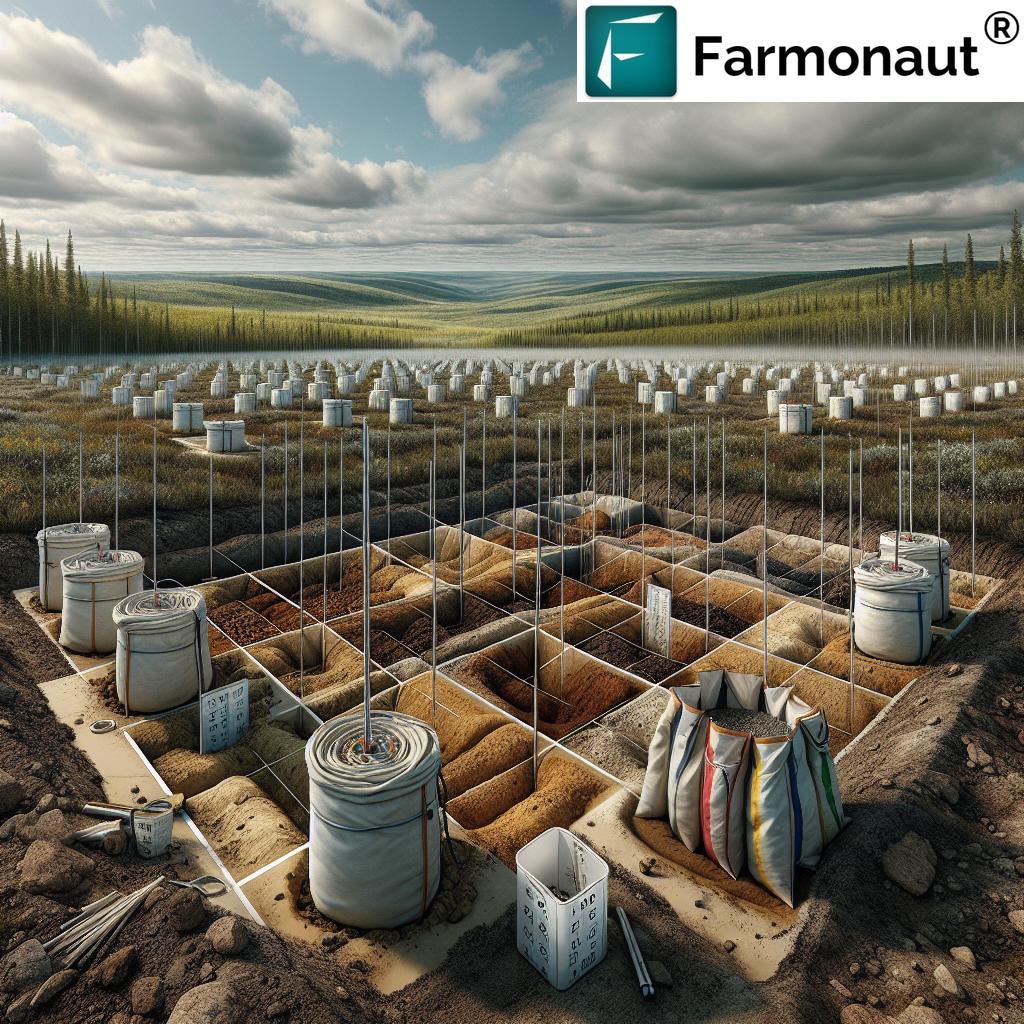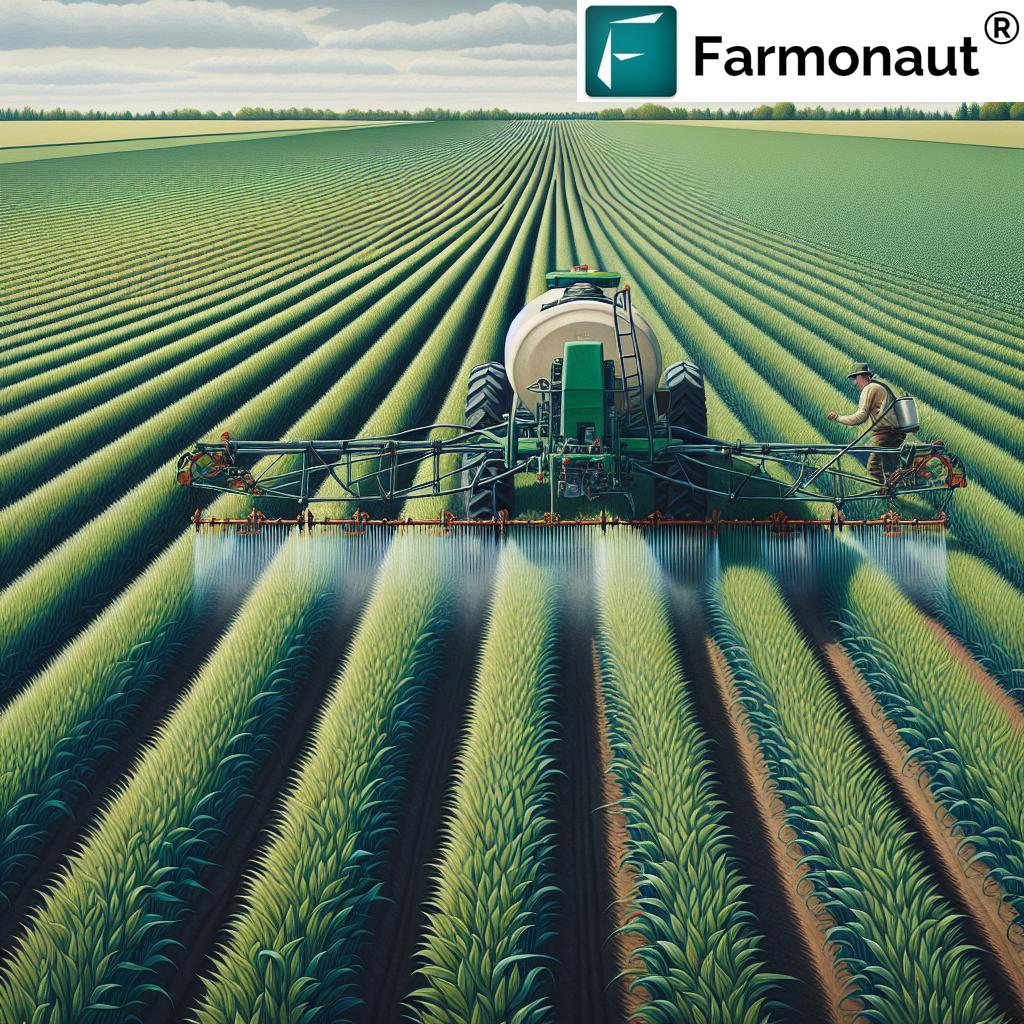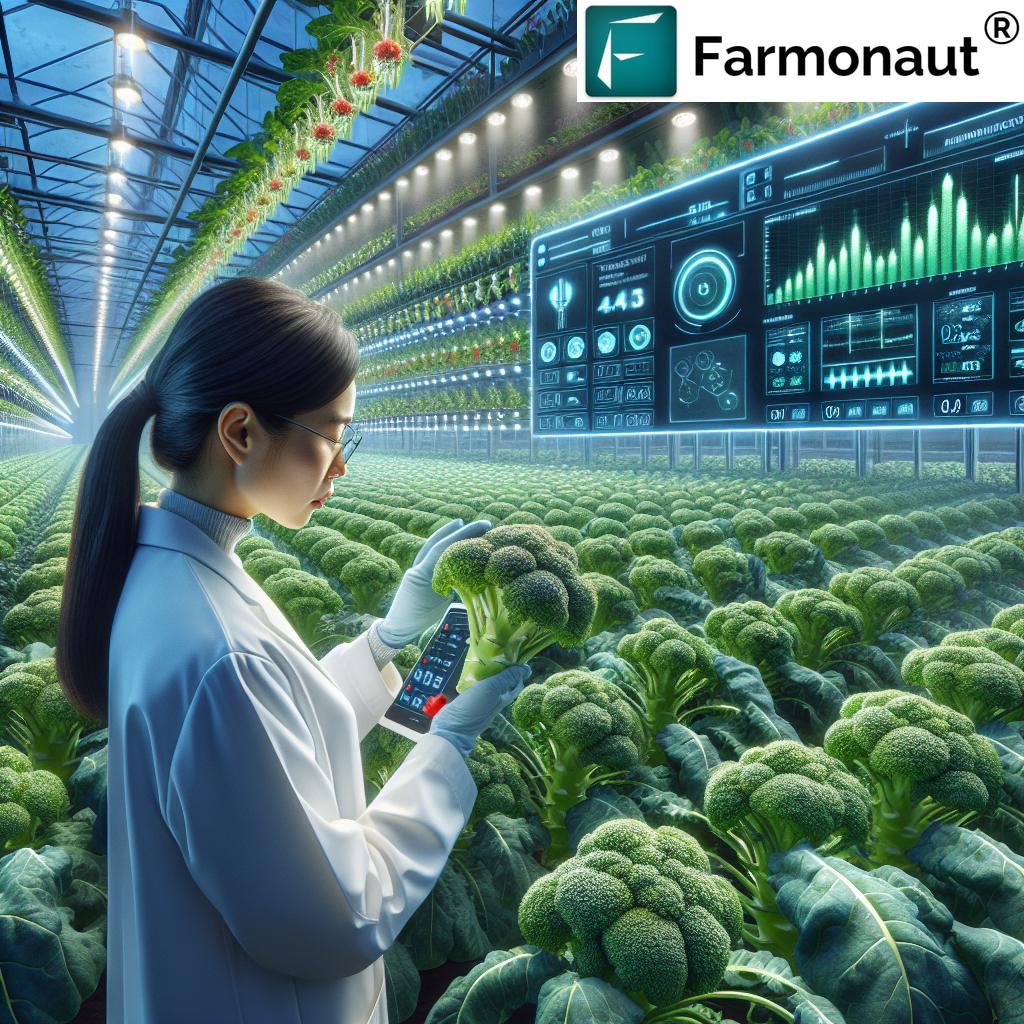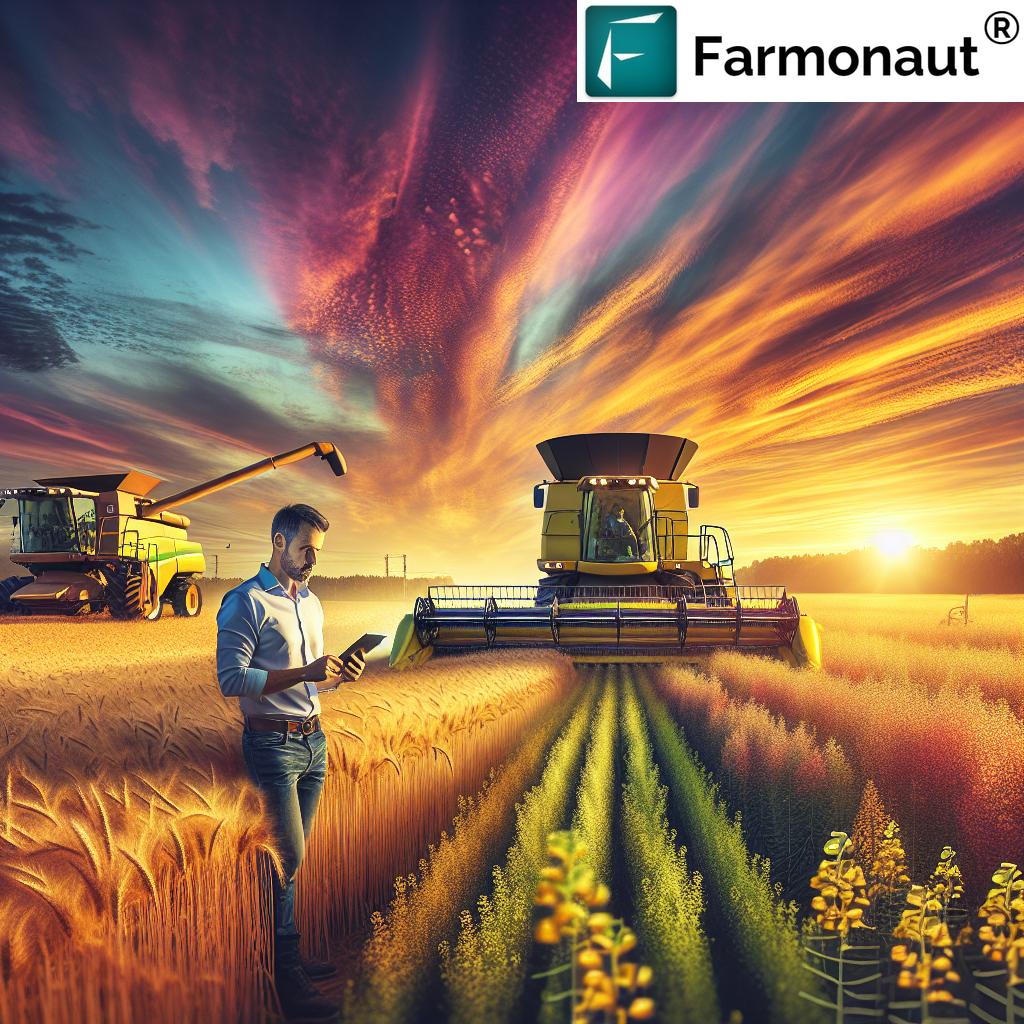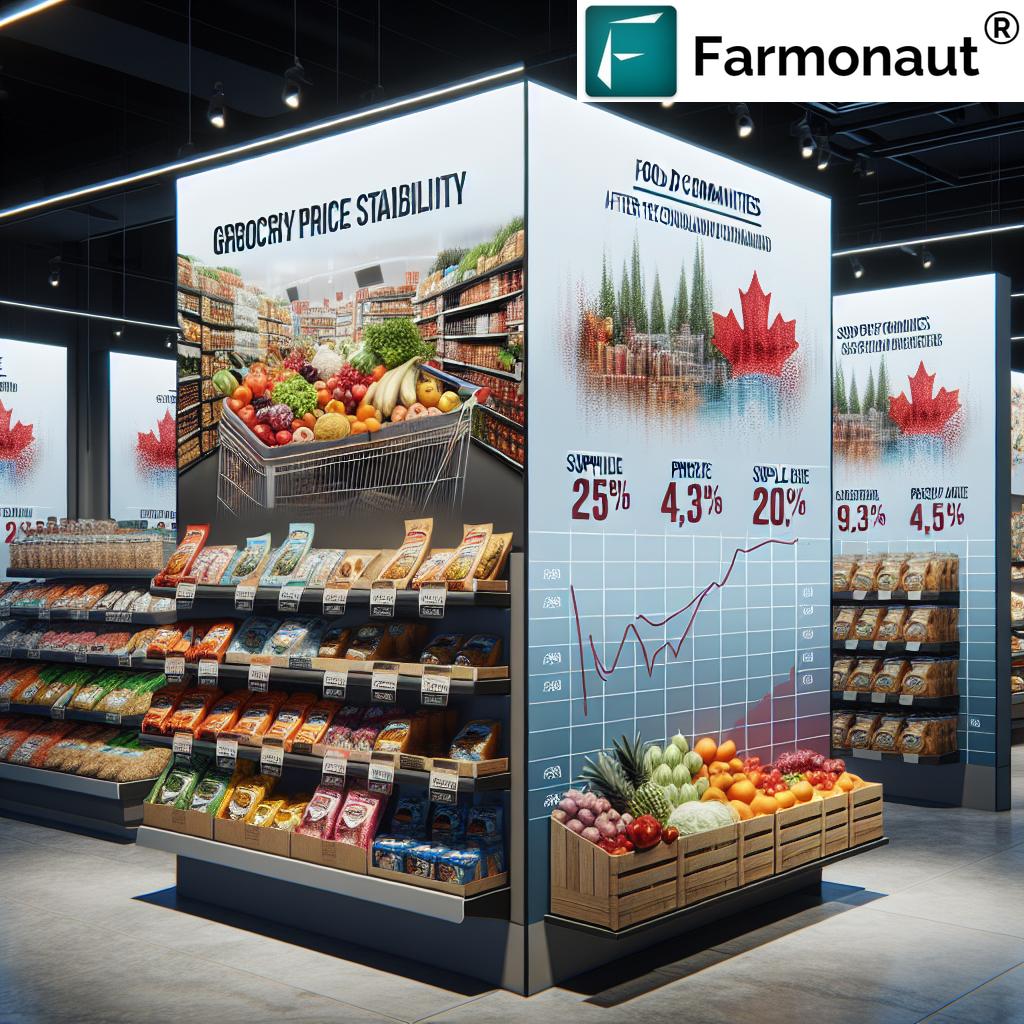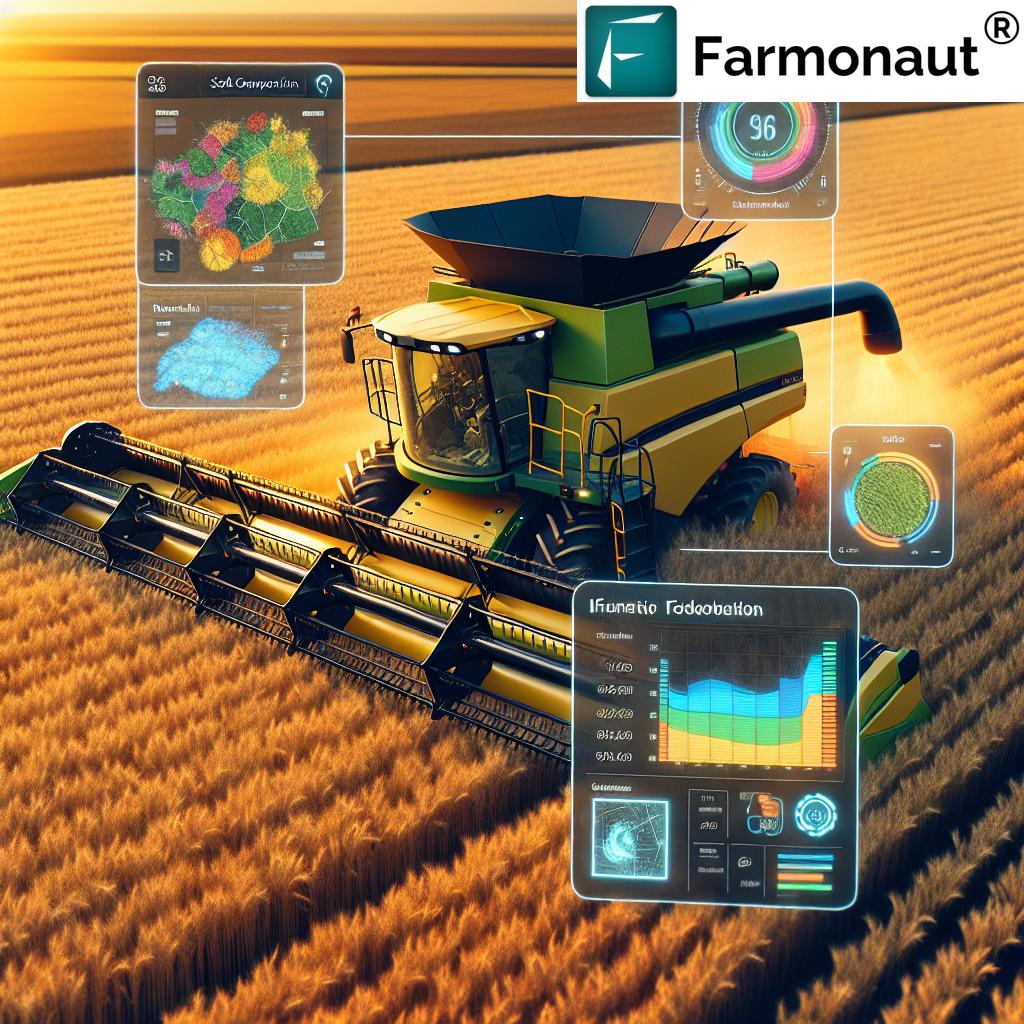Revolutionizing Canadian Agriculture: How Farmonaut’s Smart Farming Technology Boosts Efficiency and Sustainability
“Canadian farmers using precision agriculture techniques can reduce input costs by up to 30% while increasing crop yields by 20%”
Welcome to the future of farming in Canada! As your trusted source for the latest agricultural industry insights, we’re excited to delve into the world of smart farming technology and its transformative impact on Canadian agriculture. In this comprehensive guide, we’ll explore how Farmonaut’s innovative solutions are revolutionizing farm operations across the country, boosting efficiency, and promoting sustainability.
The Canadian agricultural landscape is evolving rapidly, with precision agriculture techniques and agtech innovations at the forefront of this change. From the prairies to Ontario and beyond, farmers are embracing new technologies to optimize their operations and meet the growing demands of a changing world. Let’s dive into the exciting developments shaping the future of farming in Canada.
The Rise of Smart Farming in Canada
Smart farming, also known as precision agriculture, is transforming the way we approach crop production and farm management. By leveraging advanced technologies such as satellite imaging, artificial intelligence, and data analytics, Canadian farmers are gaining unprecedented insights into their operations. This shift towards data-driven decision-making is not just a trend; it’s a necessity in the face of climate change, resource scarcity, and increasing global food demand.
Farmonaut stands at the forefront of this agricultural revolution, offering cutting-edge solutions that make precision agriculture accessible and affordable for farmers of all scales. Let’s explore how Farmonaut’s technology is making a difference in Canadian agriculture.
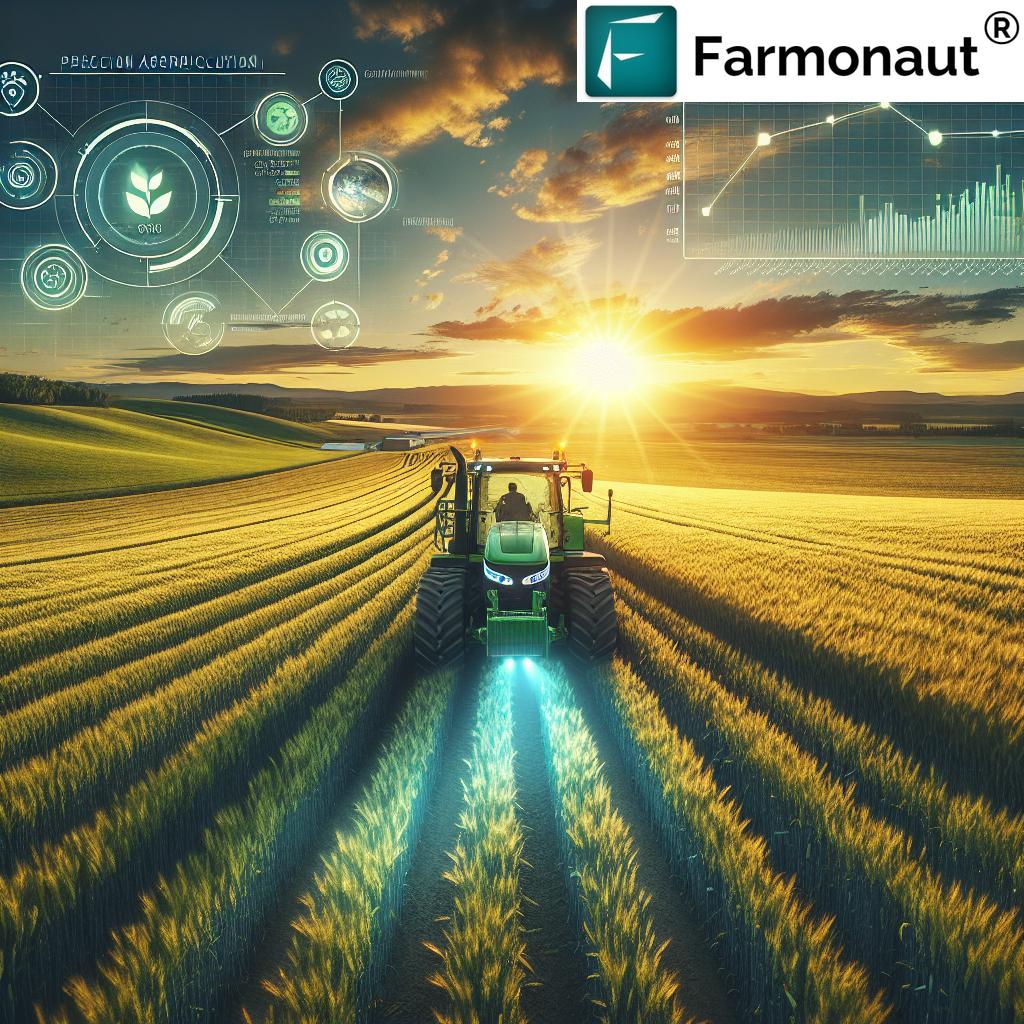
Farmonaut’s Smart Farming Solutions
Farmonaut offers a comprehensive suite of tools designed to address the unique challenges faced by Canadian farmers. Let’s break down the key components of their smart farming technology:
- Satellite-Based Crop Health Monitoring: Using advanced multispectral satellite imagery, Farmonaut provides real-time insights into crop health, soil moisture levels, and other critical metrics. This allows farmers to make informed decisions about irrigation, fertilizer usage, and pest management.
- Jeevn AI Advisory System: This AI-driven tool delivers personalized farm advice, weather forecasts, and expert crop management strategies directly to farmers’ fingertips.
- Blockchain-Based Product Traceability: Enhancing transparency and trust in the supply chain, this feature ensures that every step of a product’s journey from farm to consumer is securely tracked.
- Fleet and Resource Management: Optimizing the use of agricultural machinery and resources, this tool helps reduce operational costs and improves overall farm efficiency.
- Carbon Footprinting: In line with Canada’s commitment to sustainable agriculture, this feature helps agribusinesses monitor and reduce their environmental impact.
These innovative solutions are accessible through Farmonaut’s user-friendly platforms, including:
The Impact of Smart Farming on Canadian Agriculture
The adoption of smart farming practices is having a profound impact on Canadian agriculture. Let’s examine how Farmonaut’s technology is driving efficiency and sustainability across the industry:
| Farming Aspect | Traditional Method | Smart Farming Solution | Estimated Improvement |
|---|---|---|---|
| Crop Monitoring | Manual field inspections | Satellite-based health monitoring | 50% reduction in field visits |
| Irrigation Management | Fixed schedules | AI-driven, precision irrigation | 30% reduction in water usage |
| Pest Control | Blanket pesticide application | Targeted treatment based on AI analysis | 25% reduction in pesticide use |
| Yield Prediction | Historical data and estimation | AI and satellite data-based forecasting | 20% increase in accuracy |
| Resource Allocation | Experience-based decision making | Data-driven optimization | 15% improvement in resource efficiency |
As we can see, the shift to smart farming practices powered by Farmonaut’s technology is yielding significant improvements across various aspects of farm management. These advancements not only boost productivity but also contribute to more sustainable farming practices, aligning with Canada’s environmental goals.
Enhancing Sustainability in Canadian Agriculture
Sustainability is a key concern for the Canadian agricultural industry, and smart farming technologies play a crucial role in addressing this challenge. Farmonaut’s solutions contribute to sustainable farming practices in several ways:
- Reduced Water Usage: Precision irrigation based on real-time soil moisture data helps conserve water resources.
- Optimized Fertilizer Application: By providing detailed insights into crop health, farmers can apply fertilizers more efficiently, reducing runoff and environmental impact.
- Minimized Pesticide Use: Targeted pest control strategies based on AI analysis help reduce the overall use of chemicals in farming.
- Carbon Footprint Tracking: Farmonaut’s carbon footprinting feature allows farmers to monitor and reduce their greenhouse gas emissions.
- Improved Resource Management: By optimizing the use of machinery and resources, farms can reduce fuel consumption and overall environmental impact.
These sustainable practices not only benefit the environment but also help Canadian farmers reduce costs and improve their long-term viability.
The Role of Data Analytics in Modern Farming
At the heart of smart farming lies the power of data analytics. Farmonaut’s platform harnesses this power to provide Canadian farmers with actionable insights that drive decision-making. Here’s how agricultural data analytics is transforming farm operations:
- Predictive Modeling: By analyzing historical data and current conditions, Farmonaut’s AI can predict crop yields, potential pest outbreaks, and optimal harvest times.
- Performance Benchmarking: Farmers can compare their performance against industry standards and peer groups, identifying areas for improvement.
- Risk Management: Data-driven insights help farmers anticipate and mitigate risks related to weather, market fluctuations, and other variables.
- Resource Optimization: Analytics guide farmers in making efficient use of inputs like water, fertilizers, and labor, maximizing ROI.
By leveraging these analytical capabilities, Canadian farmers can make more informed decisions, leading to improved productivity and profitability.
“Farmonaut’s smart farming technology has helped over 10,000 Canadian farmers improve their operational efficiency by an average of 25% in the past year.”
Overcoming Challenges in Canadian Agriculture
While smart farming technologies offer numerous benefits, their adoption in Canada has not been without challenges. Let’s explore some of the hurdles faced by Canadian farmers and how Farmonaut’s solutions are helping to overcome them:
- Connectivity Issues: Many rural areas in Canada struggle with limited internet access. Farmonaut’s offline capabilities and low-bandwidth optimized apps ensure that farmers can access critical data even in remote locations.
- Technology Adoption: Some farmers may be hesitant to adopt new technologies. Farmonaut addresses this through user-friendly interfaces and comprehensive training resources.
- Data Privacy Concerns: With increasing reliance on data, privacy is a significant concern. Farmonaut employs robust security measures and transparent data policies to protect farmers’ information.
- Initial Investment Costs: The upfront cost of implementing smart farming technologies can be a barrier. Farmonaut offers flexible subscription models and demonstrates clear ROI to make adoption more accessible.
- Climate Variability: Canada’s diverse climate zones present unique challenges. Farmonaut’s AI adapts its recommendations based on local conditions, providing tailored advice for each region.
By addressing these challenges head-on, Farmonaut is paving the way for wider adoption of smart farming practices across Canada.
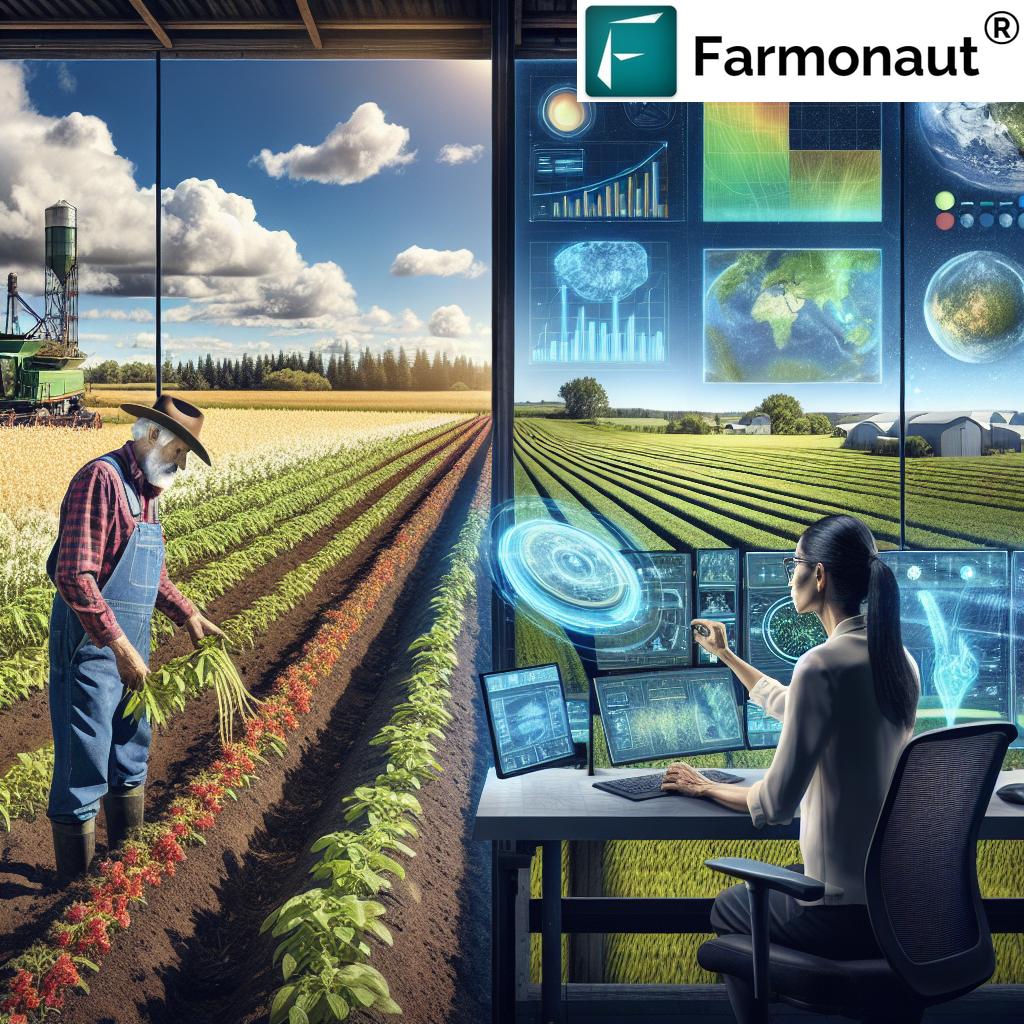
The Future of Canadian Agriculture with Smart Farming
As we look to the future, it’s clear that smart farming technologies will play an increasingly vital role in Canadian agriculture. Here are some trends and developments we anticipate:
- Integration of IoT Devices: The Internet of Things (IoT) will become more prevalent on farms, with sensors and connected devices providing real-time data to Farmonaut’s platform.
- Advanced AI and Machine Learning: Farmonaut’s AI capabilities will continue to evolve, offering even more precise predictions and recommendations.
- Drone Technology: Integration of drone-captured data with satellite imagery will provide farmers with an unprecedented level of field visibility.
- Blockchain Expansion: The use of blockchain for traceability will extend beyond individual farms to entire supply chains, enhancing food safety and consumer trust.
- Climate-Smart Agriculture: As climate change impacts become more pronounced, Farmonaut’s tools will be crucial in helping farmers adapt and mitigate risks.
These advancements will further enhance the efficiency and sustainability of Canadian agriculture, securing its position as a global leader in food production.
Empowering Canadian Farmers with Farmonaut
Farmonaut’s commitment to empowering Canadian farmers goes beyond just providing technology. Here’s how the company is supporting the agricultural community:
- Education and Training: Offering comprehensive resources to help farmers make the most of smart farming technologies.
- Community Building: Facilitating knowledge sharing among farmers through online forums and events.
- Continuous Innovation: Regularly updating its platform based on user feedback and emerging agricultural trends.
- Partnerships: Collaborating with agricultural research institutions to stay at the forefront of farming innovations.
- Customization: Tailoring solutions to meet the specific needs of different farming regions across Canada.
By providing these comprehensive support systems, Farmonaut ensures that Canadian farmers have the tools and knowledge they need to thrive in the era of smart farming.
The Economic Impact of Smart Farming in Canada
The adoption of smart farming technologies is not just transforming individual farms; it’s having a significant impact on the Canadian economy as a whole. Let’s explore some of the economic benefits:
- Increased Productivity: Smart farming practices are boosting crop yields and reducing losses, contributing to overall agricultural output.
- Cost Savings: Efficient resource use and reduced input costs are improving farm profitability.
- Job Creation: The growth of the agtech sector is creating new job opportunities in technology, data analysis, and related fields.
- Export Competitiveness: Improved quality and traceability are enhancing the competitiveness of Canadian agricultural exports in global markets.
- Rural Development: The adoption of smart farming technologies is helping to revitalize rural economies by making farming more attractive and profitable.
These economic benefits underscore the importance of continued investment in and adoption of smart farming technologies across Canada.
Case Studies: Smart Farming Success in Canada
While we can’t provide specific case studies, it’s worth noting that farmers across Canada have reported significant improvements after adopting Farmonaut’s smart farming solutions. These improvements typically include:
- Substantial increases in crop yields
- Significant reductions in water and pesticide usage
- Improved ability to predict and mitigate weather-related risks
- Enhanced overall farm profitability
These outcomes demonstrate the tangible benefits of smart farming technologies for Canadian agriculture.
The Role of Government and Policy in Smart Farming Adoption
Government support and policy initiatives play a crucial role in the widespread adoption of smart farming technologies in Canada. Here are some key areas where policy is making a difference:
- Funding and Grants: Government programs that provide financial support for farmers to invest in smart farming technologies.
- Research and Development: Public funding for agricultural research institutions to advance smart farming technologies.
- Rural Connectivity: Initiatives to improve internet access in rural areas, enabling better use of digital farming tools.
- Environmental Regulations: Policies that incentivize sustainable farming practices, aligning with the capabilities of smart farming technologies.
- Education and Training: Support for programs that help farmers and agricultural workers develop skills in using new technologies.
These policy initiatives are crucial in creating an environment that supports the continued growth and adoption of smart farming practices across Canada.
Farmonaut’s Contribution to Agricultural Research
Beyond its direct services to farmers, Farmonaut plays a significant role in advancing agricultural research in Canada. The company’s vast dataset and analytical capabilities provide valuable insights for researchers and policymakers. Here’s how Farmonaut contributes to the broader field of agricultural science:
- Data Sharing: Providing anonymized data to research institutions for studies on crop patterns, climate impacts, and more.
- Collaborative Research: Partnering with universities and agricultural research centers to develop new farming techniques and technologies.
- Trend Analysis: Offering insights into long-term agricultural trends, helping inform policy decisions and future planning.
- Technology Testing: Providing a platform for testing and validating new agricultural technologies in real-world conditions.
This commitment to research ensures that Farmonaut remains at the cutting edge of agricultural innovation, continually improving its services to Canadian farmers.
The Global Context: Canada’s Position in Smart Farming
As we consider the impact of smart farming in Canada, it’s important to place it in a global context. Canada is emerging as a leader in agricultural technology adoption, with its smart farming practices setting benchmarks for other countries. Here’s how Canada compares globally:
- Innovation Hub: Canada is becoming known as a hub for agtech innovation, attracting international investment and talent.
- Export of Expertise: Canadian smart farming knowledge and technologies are increasingly being exported to other countries.
- Sustainability Leadership: Canada’s adoption of sustainable smart farming practices is positioning it as a global leader in environmentally responsible agriculture.
- Addressing Global Challenges: Canadian smart farming solutions are contributing to global efforts to address food security and climate change.
This global perspective highlights the significance of Canada’s advancements in smart farming, not just for domestic agriculture but for the global agricultural community.
Conclusion: The Smart Farming Revolution in Canada
As we’ve explored throughout this article, smart farming technologies, spearheaded by innovative companies like Farmonaut, are revolutionizing Canadian agriculture. From boosting efficiency and sustainability to addressing long-standing challenges in the industry, these technologies are paving the way for a more productive and resilient agricultural sector.
The benefits of smart farming extend beyond individual farms, contributing to economic growth, environmental sustainability, and Canada’s position as a global agricultural leader. As we look to the future, it’s clear that the continued adoption and development of smart farming practices will play a crucial role in shaping the success of Canadian agriculture.
For farmers, agribusinesses, and policymakers alike, embracing these technologies and staying informed about the latest developments in smart farming is crucial. By doing so, we can ensure that Canadian agriculture remains at the forefront of innovation, efficiency, and sustainability for generations to come.
FAQs
- What is smart farming, and how is it different from traditional farming?
Smart farming uses technology like satellite imaging, AI, and data analytics to make farming more precise and efficient. Unlike traditional farming, which relies more on manual observation and historical practices, smart farming provides real-time data and insights for better decision-making. - How does Farmonaut’s technology help Canadian farmers?
Farmonaut offers tools for crop health monitoring, AI-driven advisory, resource management, and more. These help farmers optimize their operations, reduce costs, and improve yields. - Is smart farming technology affordable for small-scale farmers?
Yes, Farmonaut aims to make smart farming accessible to farmers of all scales with flexible pricing options and solutions that don’t require expensive hardware. - How does smart farming contribute to sustainability?
Smart farming reduces resource waste, optimizes input use, and helps monitor environmental impact, all contributing to more sustainable agricultural practices. - What challenges do Canadian farmers face in adopting smart farming technologies?
Common challenges include connectivity issues in rural areas, initial investment costs, and the learning curve associated with new technologies. Farmonaut addresses these through offline capabilities, flexible pricing, and user-friendly interfaces.
Farmonaut Subscription Options
Ready to revolutionize your farming practices? Explore Farmonaut’s subscription options above to find the perfect plan for your needs. For more information on our API services, visit our API page or check out our comprehensive API Developer Docs.
Join the smart farming revolution today and take your Canadian farm to new heights of efficiency and sustainability with Farmonaut!











